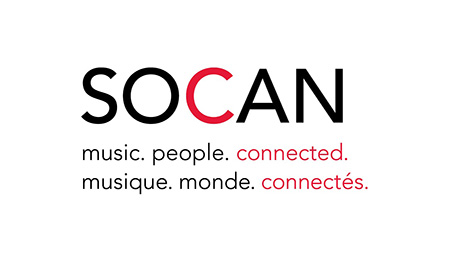
A Guide to SOCAN for Dance NS Members
One of the benefits of being a member of Dance NS is being able to purchase a SOCAN license at the lowest price.
What’s a SOCAN license, you ask, and why would I need one?
SOCAN (website socan.ca) is the Society of Composers, Authors and Music Publishers of Canada. It’s a non‐profit organization which represents the rights of composers and music publishers (a music publisher is a company which handles the music rights for composers). SOCAN licenses businesses and individuals to use music, and distributes the royalties to the composers and publishers. Each license usually lasts a year, from January 1 to December 31. Costs vary depending on what kind of license you purchase.
SOCAN has many different types of licenses (called “tariffs”) for different types of situations involving the use of music. Forexample, there is a license for playing background music in elevators, a license for performing music in a concert, a license for playing music in the background at an event, and so on. As a dance teacher, the tariff you would need is Tariff 19, which is the license to play music for dance instruction or fitness activities. Please note this is not the same kind of license you would need for playing music as part of a performance – that’s a different tariff, for which you would have to deal with SOCAN directly.
You may wonder why you need a license if you’ve already bought the music, i.e. if you paid for it through iTunes or bought the CD. Buying the music this way gives you the right for private use only, but not for broadcasting, or for using it in performance or in the classes you teach.
What kind of music does SOCAN apply to?
SOCAN applies to any music to which royalty rights apply. Music that is in the public domain would not need a SOCAN license. Usually the music rights expire after 50 years after the death of the author or composer. Most traditional music would fall into this category.
How much does a SOCAN Tariff 19 cost?
It depends on the number of participants per week. For Tariff 19, SOCAN charges $2.14 times the average number of participants per week as the annual fee, with the minimum fee being $64 + taxes. For Nova Scotia, that would make the minimum fee $73.60 ($64 + 15% HST). Let’s do an example: if you teach 3 dance classes per week, with 15 students in one class, 10 students in another class, and 12 students in the third class, your SOCAN license fee would be $2.14 x 15 + $2.14 x 10 + $2.14 x 12 = $79.18 + taxes = $91.06. As you can see, the more students you teach, the more the SOCAN Tariff 19 will cost.
However, Dance Nova Scotia negotiated an arrangement with SOCAN in 2002 whereby any Dance NS individual member can purchase the SOCAN Tariff 19 license at the lowest rate ($74.82.00 + 15% HST), no matter how many students they teach.
You may not need to purchase a SOCAN license if you teach at facilities which all have SOCAN licenses of their own. For example, suppose you teach at Terrific Dance Studio which has paid for a SOCAN license to cover all their classes. If you teach only at Terrific Dance Studio, you would not need your own SOCAN license. However, if you teach at both Terrific Dance Studio and Awesome Academy of Dance, you’d would need to check that Awesome Academy had a SOCAN license as well; otherwise you wouldn’t be completely covered.
One more point which has come up with our members who have been contacted by Re:Sound about licenses – what is the difference between Re:Sound and SOCAN?
Re:Sound (www.resound.ca) is an organization similar to SOCAN, but instead of representing composers and music publishers, it represents the recording artists and record companies. The Re:Sound license is separate from the SOCAN license. If you do not use recorded music, then you don’t need to get a Re:Sound license. If you do use recorded music, then you would have to deal with Re:Sound directly about a license – Dance Nova Scotia does not have a licensing agreement with Re:Sound. We are connected to current negotiations with Re:Sound for a fair assessment of fees for dance studios but so far nothing has been agreed to.
Important POSTSCRIPT:
As of May 1, 2019 SOCAN and RE:Sound have merged to form one licensing body caller Entandem.
Dance NS will continue to offer a reduced cost SOCAN license to our members but not for dance studios that receive RE:Sound licensing. This merger could mean a bigger presence of these licensing bodies in our region, which could mean more policing to ensure all teachers and or studios have up to date licenses

